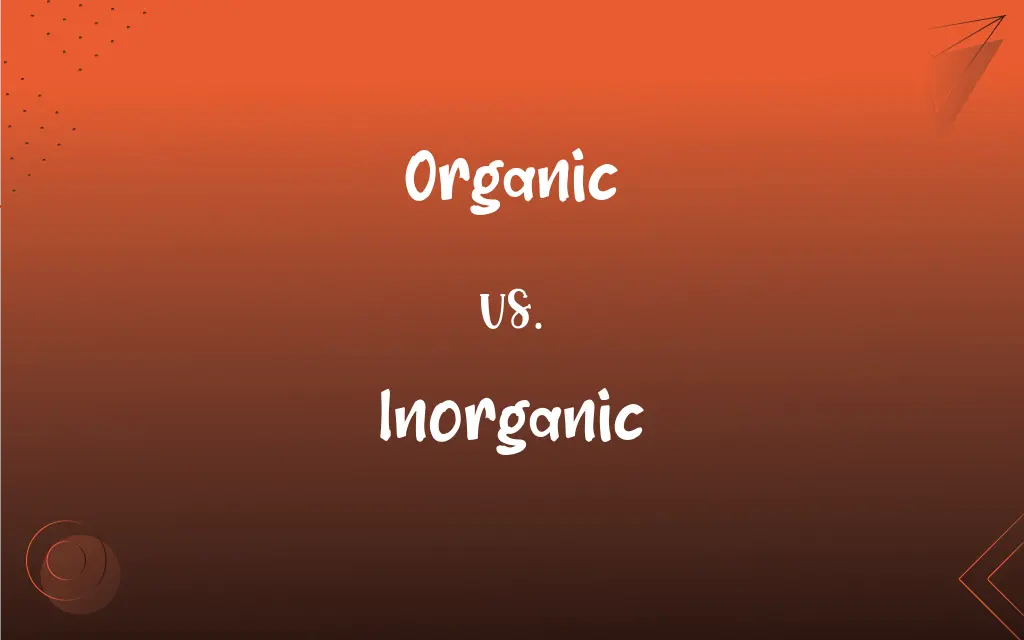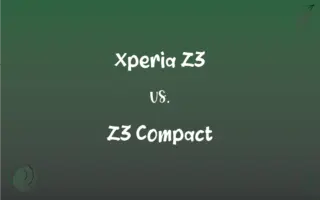Organic vs. Inorganic: What's the Difference?
Edited by Aimie Carlson || By Harlon Moss || Updated on October 16, 2023
Organic generally pertains to living entities or carbon-based compounds, while inorganic relates to non-living or non-carbon-based substances.

Key Differences
Organic and inorganic are terms that can be used in various contexts but are most commonly associated with chemistry. Organic primarily refers to compounds containing carbon and hydrogen atoms, often in chains or rings. This category includes a myriad of substances, from simple molecules like methane to complex molecules such as DNA. Inorganic, in contrast, encompasses substances that aren't based on carbon-hydrogen compounds.
When discussing agriculture, organic denotes farming practices that refrain from using synthetic chemicals or genetically modified organisms. It signifies a more natural approach to agriculture, focusing on soil health and environmental balance. Inorganic, in this context, doesn't specifically pertain to farming but, when juxtaposed with organic, might hint at farming methods that utilize synthetic chemicals or practices not deemed "natural."
In the realm of food labeling, organic foods are those produced without synthetic pesticides, artificial preservatives, or irradiation. Consumers often choose organic products for health or environmental reasons. Inorganic doesn't typically label food products, but foods not meeting the organic criteria fall into this general category.
Another interesting note is in the area of shapes and structures. Organic compounds, due to their carbon backbone, often have intricate and varied structures. Inorganic substances, on the other hand, have a more varied range of components beyond carbon, leading to a vast array of structures, from simple salts like sodium chloride to complex minerals.
Lastly, the origin of the terms gives insight into their meaning. "Organic" is derived from the Greek word "organikos," meaning "relating to an organ or instrument." Historically, it was thought that organic compounds could only originate from living beings. "Inorganic" simply means not organic, emphasizing the absence of carbon or its non-relation to living entities.
ADVERTISEMENT
Comparison Chart
Chemical Composition
Carbon-based compounds
Non-carbon-based compounds
Relation to Life
Pertains to living entities
Relates to non-living entities
Agricultural Context
Farming without synthetic chemicals
Might hint at farming with synthetic chemicals
Food Labeling
Foods without synthetic pesticides or artificial additives
Foods not meeting organic criteria
Structural Complexity
Often intricate due to carbon backbone
Varied structures, from simple to complex
ADVERTISEMENT
Organic and Inorganic Definitions
Organic
Produced without synthetic pesticides or fertilizers.
She buys organic fruits for her family.
Inorganic
Not having the structure or characteristics of living bodies.
Minerals are inorganic substances.
Organic
Relating to or derived from living matter.
Plants and animals are considered organic entities.
Inorganic
Chemically, not containing carbon-hydrogen bonds.
Table salt is an inorganic compound.
Organic
Chemically, compounds containing carbon.
Methane is an organic compound.
Inorganic
Not arising from natural growth.
The inorganic debris littered the site.
Organic
Characterized by continuous or natural development.
Their friendship had an organic growth over the years.
Inorganic
Lacking the properties characteristic of living organisms.
Water, despite being vital, is inorganic.
Organic
Pertaining to an organ or organs.
The organic functions of the body are vital.
Inorganic
Not resulting from or produced by growth.
The sculpture was an inorganic representation of a tree.
Organic
Of, relating to, or derived from living organisms
Organic matter.
Inorganic
Involving neither organic life nor the products of organic life.
Organic
Of, relating to, or affecting a bodily organ
An organic disease.
Inorganic
Not composed of organic matter.
FAQs
Are all inorganic compounds harmful?
No, many inorganic compounds are harmless and essential, like water.
Do inorganic substances never contain carbon?
Not always. Some inorganic compounds, like carbonates, contain carbon but lack carbon-hydrogen bonds.
Is organic food always GMO-free?
Organic standards typically prohibit genetically modified organisms.
Can organic products contain any pesticides?
Yes, but only certain natural pesticides are allowed in organic farming.
Does organic always mean healthier?
Not necessarily, organic refers to production methods, not directly to health.
Why do organic products often cost more?
Organic farming can be more labor-intensive and yield less, raising production costs.
Are organic compounds always complex?
No, some organic compounds, like methane, are quite simple.
Do inorganic foods exist?
The term "inorganic" isn't used to label foods, but foods not meeting organic standards can be deemed inorganic.
Are diamonds organic or inorganic?
Diamonds are inorganic; they're pure carbon but don't come from living organisms.
Are metals considered inorganic?
Yes, metals like iron and gold are inorganic elements.
Can organic compounds be synthesized in labs?
Absolutely, many organic substances, like medicines, are synthesized.
Can inorganic substances be created by living entities?
Yes, for instance, shellfish produce inorganic calcium carbonate shells.
Are all inorganic compounds solids?
No, inorganic compounds can be solids, liquids, or gases.
Is everything natural organic?
No, natural means derived from nature, but not all natural substances are organic.
Is organic farming always sustainable?
While it can be more sustainable, it's not a guarantee; practices vary.
Can inorganic materials be found in living entities?
Yes, many inorganic substances, like minerals, are vital to living organisms.
Why is organic chemistry a separate field?
Due to the vast array and complexity of carbon compounds, it merits specialized study.
What's an example of an organic process?
Photosynthesis in plants is an organic process.
Do inorganic substances play roles in biology?
Definitely, inorganic ions and molecules are crucial in various biological processes.
Are synthetic diamonds organic?
No, whether naturally occurring or synthetic, diamonds are inorganic.
About Author
Written by
Harlon MossHarlon is a seasoned quality moderator and accomplished content writer for Difference Wiki. An alumnus of the prestigious University of California, he earned his degree in Computer Science. Leveraging his academic background, Harlon brings a meticulous and informed perspective to his work, ensuring content accuracy and excellence.
Edited by
Aimie CarlsonAimie Carlson, holding a master's degree in English literature, is a fervent English language enthusiast. She lends her writing talents to Difference Wiki, a prominent website that specializes in comparisons, offering readers insightful analyses that both captivate and inform.































































